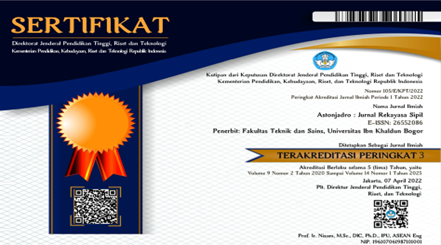The Production of Space and Resilience Strategies in Sanur Traditional Village: A Case Study in Denpasar's Tourism Context
DOI:
https://doi.org/10.32832/astonjadro.v14i1.17233Keywords:
production of space; resilience; traditional village; tourism; spatial adaptation.Abstract
This study examines the resilience and adaptation of the production of space in Sanur Traditional Village, Denpasar, amidst the pressures of tourism development. As tourism has become a key economic sector in Bali, traditional villages like Sanur face significant challenges in maintaining their socio-cultural identity while adapting to rapid changes. Using Henri Lefebvre's theory of the production of space as a conceptual framework, this research explores how Sanur negotiates between preserving traditional spatial practices and accommodating tourism demands. The study employs a qualitative case study approach, utilizing interviews, observations, and document analysis to investigate the dynamics of the production of space in Sanur. The research questions focus on: 1) How tourism development has influenced the production of space in Sanur; 2) Challenges To Traditional Spatial Planning; and 3) What resilience and adaptation strategies have been employed. The novelty of this research lies in its multidimensional approach to understanding spatial resilience in the context of a traditional Balinese village, integrating concepts of the production of space, cultural resilience, and tourism development. Preliminary findings suggest a complex interplay between traditional spatial concepts (e.g., Tri Hita Karana philosophy) and modern tourism-driven spatial transformations. The village demonstrates resilience through innovative spatial practices that balance cultural preservation with economic opportunities. This research contributes to the broader understanding of spatial resilience in traditional communities facing modernization pressures and offers insights for sustainable tourism development policies.
References
Andrea, J. (2021). Kajian Risiko Lingkungan Akibat Aktivitas Penurapan Airtanah di Wilayah Kepesisiran Desa Adat Sanur Kota Denpasar Provinsi Bali. universitas Gajah Mada.
Galani-Moutafi, V. (2013). Rural space (re)produced – Practices, performances and visions: A case study from an Aegean island. Journal of Rural Studies, 32, 103–113. https://doi.org/10.1016/j.jrurstud.2013.04.007
Gururani, S., & Kennedy, L. (2021). The Co-production of Space, Politics and Subjectivities in India’s Urban Peripheries. South Asia Multidisciplinary Academic Journal, 26(26), 11. https://doi.org/10.4000/SAMAJ.7365
Jones, C. (2021). Examining Rural Community Resilience and Health During COVID-19 using the Community Capitals Framework. University of Georgia.
Kurniawansyah, A., Susiloningtyas, D., & Manessa, M. D. M. (2023). Zone-Based Tourism Planning Using Satellite Imagery. The Journal of Indonesia Sustainable Development Planning, 4(3), 263–283. https://doi.org/10.46456/jisdep.v4i3.441
Lefebvre, H. (2007). The Production of Space. Blackwell Publishing.
Mai, X., Zhan, C., & Chan, R. C. K. (2021). The nexus between (re)production of space and economic resilience: An analysis of Chinese cities. Habitat International, 109, 102326. https://doi.org/10.1016/j.habitatint.2021.102326
Putra, I. B. G. P. (2022). PENATAAN KAWASAN PANTAI MATAHARI TERBIT DESA ADAT SANUR KAJA, DENPASAR SELATAN, KOTA DENPASAR, BALI. Lentera Karya Edukasi, 2(3), 115–124. https://doi.org/10.17509/LEKAEDU.V2I3.52457
Putra, I. B. G. P. (2023). Penataan dan Integrasi fasilitas Penunjang Pelabuhan di Pantai Matahari Terbit, Desa Adat Sanur Kaja, Denpasar, Bali. Lentera Karya Edukasi, 3(1), 51–62. https://doi.org/10.17509/LEKAEDU.V3I1.63043
Putra, I. D. G. A. D. (2020). The Impact of Dynamic Land-Use and Spatial Planning Policies on the Traditional Village and Architecture in Tourism Villages in Gianyar, Bali. BHUMI: Jurnal Agraria Dan Pertanahan, 5(3). https://doi.org/10.31292/jb.v5i3.388
Putra, I. D. G. A. D., Adhika, I. M., & Yana, A. A. G. A. (2021). Reviving Cultural Tourism in Kendran Bali Indonesia: Maintaining Traditional Architecture and Developing Community-based Tourism. Civil Engineering and Architecture, 9(2), 328–338. https://doi.org/10.13189/cea.2021.090206
Rega, C., & Bonifazi, A. (2020). The Rise of Resilience in Spatial Planning: A Journey through Disciplinary Boundaries and Contested Practices. Sustainability, 12(18), 7277. https://doi.org/10.3390/su12187277
Soszyński, D., Sowińska-Świerkosz, B., Stokowski, P. A., & Tucki, A. (2018). Spatial arrangements of tourist villages: implications for the integration of residents and tourists. Tourism Geographies, 20(5), 770–790. https://doi.org/10.1080/14616688.2017.1387808
Utami, A. W. (2017). Community Resilience to Climate Change in Rural Java, Indonesia [Dissertation]. Oregon State University.
Widiyani, D. M. S. (2014). PERKEMBANGAN DAERAH PARIWISATA SANUR. Jurnal Anala, 2(2). https://doi.org/10.46650/ANALA.2.2.188
Yang, Y., & Wang, Y. (2023). Exploring Rural Resilient Factors Based on Spatial Resilience Theory: A Case Study of Southern Jiangsu. Land, 12(9), 1677. https://doi.org/10.3390/land12091677
Ye, C., Ma, X., Gao, Y., & Johnson, L. (2020). The lost countryside: Spatial production of rural culture in Tangwan village in Shanghai. Habitat International, 98, 102137. https://doi.org/10.1016/j.habitatint.2020.102137
Zhang, Q., Lu, L., Huang, J., & Zhang, X. (2022). Uneven development and tourism gentrification in the metropolitan fringe: A case study of Wuzhen Xizha in Zhejiang Province, China. Cities, 121, 103476. https://doi.org/10.1016/j.cities.2021.103476
Zhuang, L., & Ye, C. (2023). Spatial production in the process of rapid urbanisation and ageing: A case study of the new type of community in suburban Shanghai. Habitat International, 139, 102883. https://doi.org/10.1016/j.habitatint.2023.102883
Downloads
Published
How to Cite
Issue
Section
License
Copyright (c) 2025 ASTONJADRO

This work is licensed under a Creative Commons Attribution-ShareAlike 4.0 International License.
Paper submitted to ASTONJADRO is the sole property of the Astonjadro Journal. Unless the author withdraws the paper because he does not want to be published in this journal. The publication rights are in the journal Astonjadro.ASTONJADRO
LICENSE
This work is licensed under a Creative Commons Attribution-ShareAlike 4.0 International License.
Based on a work at http://ejournal.uika-bogor.ac.id/index.php/ASTONJADRO













